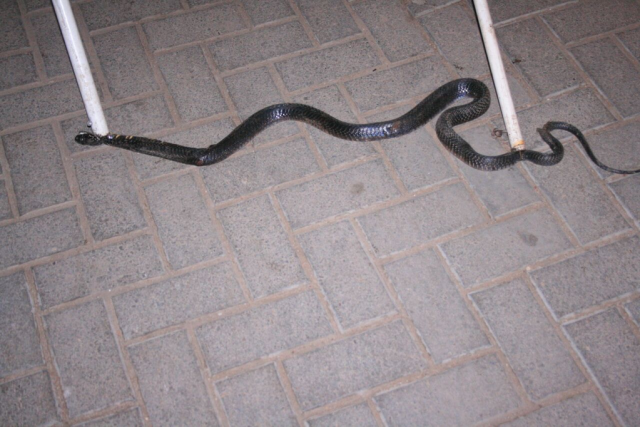‘Killing non-poisonous snakes incurs loss of millions’
Unaware residents of Thar kill the harmless creatures out of fear of snake bites

Unaware residents of Thar kill the harmless creatures out of fear of snake bites. PHOTO: LIAQUATABAD POLICE STATION
According to the basic findings of these researchers from University of Sindh, Jamshoro, Sindh Agricultural University, Jamshoro, and People University of Medical and Health Sciences for Women, Nawabshah, Thar is a district where more than 90 species of snakes are found. Out of these, 99 per cent are non-poisonous.
"To protect themselves from snake bite, the unaware residents kill every snake, which is leading to an increase in the number of hamsters in the province," said researcher Dr Allah Bux, holding a snake with brown and white stripes. According to him, the increasing number of hamsters is directly incurring a loss of million dollars every year. Holding a small white mouse with its pink tail, he said that these small mice eat more than 26 per cent of the stored grains in the godowns of the markets. "Every hamster born is a loss to our stored food.”

Project director Dr Naim Quraishi highlighted another problem that the mice create — they greatly contribute to breaches in the canals and water courses. "For over seven months of the year, when there is no water in canals, these mice make holes in the mud and make the surface weak," he said. Talking about how the breaches in the canals affect the crops, he said that when the water is released in the canals at the time of harvest, they [canals] already have holes. This makes the fields fill with water and destroys the whole crop of the season. "Hamsters are not causing problems in just one particular city. They are present all over Sindh, including Khairpur, Larkana, Hyderabad and Naushero Feroz," he added.
Read: Hunting them down: Civic agencies kill stray dogs with guns, poison
Talking about the species of snakes found in Thar, Quraishi said that there is hardly any poisonous specie in the area. "Lungi is one [specie] that is venomous and can be found in this district," he said, adding that the residents of Thar are able to recognise and differentiate it from other species. He stressed the importance of the tagline, 'Don't kill the snake, move it'. He was of the view that even poisonous snakes should not be killed but moved to some other place. "People should make a net basket attached to a long stick that can help you catch the snake," he said, adding that the snakes caught with the help of this stick should be then thrown to another location away from the home.
The researchers have also designed a snake stick, which costs about Rs800. The same kind of stick costs Rs7,000 in India and $1,200 in the United States. Demonstrating with a red snake stick, Bux said it will be helpful for people to throw a snake away if one is found in their houses.
To spread awareness among the people of rural Thar, the researchers also came up with vials containing anti-snake vaccines on trial. "By the end of June, we will be able to produce 500 to 1,000 vials, which will help people survive the snake bite," he said. One such vial, costing Rs600 at most, will be enough for a person unlike the anti-snake vaccines provided by the National Institute of Health in Islamabad, eight of which are needed for one patient.
"Surveys suggest that there are about 13 species of snakes in Sindh that are poisonous, which makes about 75 per cent of the snakes found in the area non-poisonous," said Bux.
Published in The Express Tribune, June 22nd, 2015.



















COMMENTS
Comments are moderated and generally will be posted if they are on-topic and not abusive.
For more information, please see our Comments FAQ